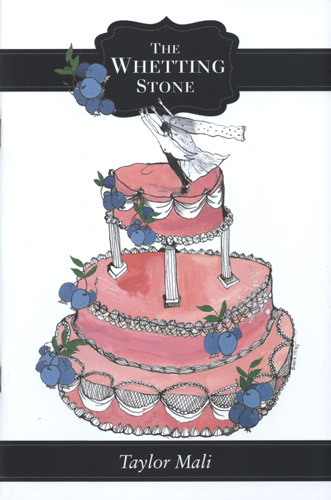The Whetting Stone
What do you do when the person who promised to stay with you for better and worse, sickness and health leaves? What if they leave by taking their own life? What do you do with the subsequent feelings of betrayal, sadness, and guilt? If you’re Taylor Mali, you write poetry about it. The Whetting Stone, winner of the 2017 Rattle Chapbook Prize, encapsulates Mali’s grief in the aftermath of his wife’s suicide in 2004.
What do you do when the person who promised to stay with you for better and worse, sickness and health leaves? What if they leave by taking their own life? What do you do with the subsequent feelings of betrayal, sadness, and guilt? If you’re Taylor Mali, you write poetry about it. The Whetting Stone, winner of the 2017 Rattle Chapbook Prize, encapsulates Mali’s grief in the aftermath of his wife’s suicide in 2004.
The chapbook is made up of nineteen poems, each one peeling back another layer to the lead-up and the aftermath. The first poem, “Grief Moves,” reads as foreshadowing:
I remember after my father died,
how my wife let me fill her full
of my tears when I came home,
[ . . . ] grief
having grown inside her
and become a kind of need.
Mali looks at the way grief is transferred, how it’s absorbed from one person to another, and how it saturates, becoming a part of someone—almost like a need for some.
While much of what we know about Mali’s wife centers around her death, we are given glimpses of Mali’s wife and their shared life. In “Making Ravioli,” we see the way the married couple once worked together:
If you were the flour,
I would say you hold me like the eggs,
broken and mixed up as I am.
And if you were the eggs
I would say you are what keeps me together,
that you know how to stir me up.
He walks through each ingredient and step, comparing each to her and their relationship. Instead of just making ravioli, Mali ends up conjuring his wife for us, kneading her into shape. The loving language used preps us for the poems to follow, the ones that delve deeper into loss and grief.
In the next poem “Six Stories,” Mali reveals:
Years ago, on a Monday morning, my wife,
dressed for work in a new suit and elegant shoes,
stepped outside the window and fell to her death
six stories below.
He then imagines the other stories—six stories of her life that may have brought her there, a creative play on words as he attempts to make sense of everything.
Mali explores the other emotions at play in his grief, including a sort of guilt which is expressed in “Depression, Too, Is a Kind of Fire.” In this prose poem, Mali admits to memories that make him feel like “an idiot” who didn’t fully understand what his wife was going through. He ends:
And I was going to write a poem about how fire is the only thing that can make a person jump out a window. And maybe I’m an idiot for thinking I could have saved her, could have loved her more [ . . . ]. But depression, too, is a kind of fire. And I know nothing of either.
Again, he tries making sense of something that makes no sense, while grappling with his own imagined or real responsibilities relating to it.
Throughout the pages of The Whetting Stone, Mali repeatedly shows he is unafraid of facing and working through the messy parts of loss, the residual feelings the one still living is left to sort through. Again and again, he picks at the scabs, each poem a new wound uncovered. While far from an easy read, Taylor Mali’s skillful handling of language gently eases us into and then anchors us to the story of his wife. He navigates each moment with grace and respect, thoughtfully and lovingly giving a voice to someone who’s no longer able to tell the story herself.





